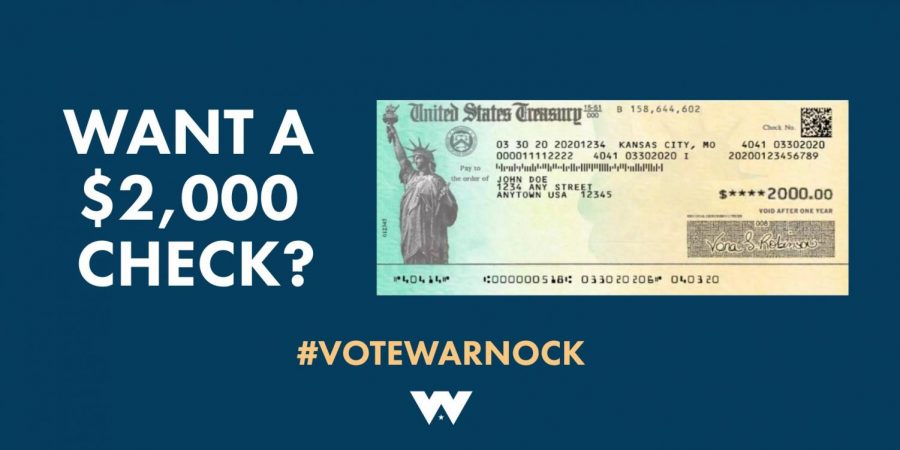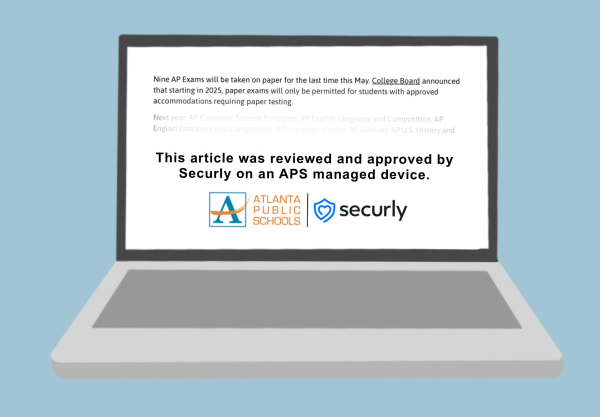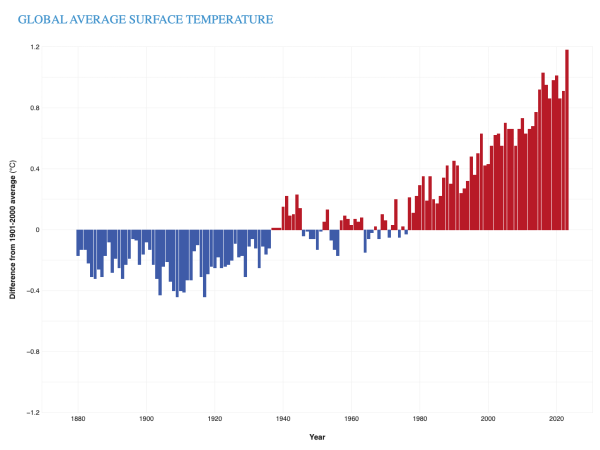Biden’s stimulus package fails $2000 promise
Senate runoff candidate Raphael Warnock based his successful campaign on a promise of $2000 checks to all Americans. However, after only $1400 in direct, targeted relief has been passed as a result, the promise has not been kept.
March 28, 2021
It’s typical for politicians to flout lofty campaign promises. What’s more uncommon is for that promise to have a specific dollar amount, an exact debt owed to constituents.
A major promise from Democrats to Georgians, in exchange for flipping the Senate in their favor during the January runoffs, was $2,000 stimulus checks. Both candidates, Jon Ossoff and Rev. Raphael Warnock, based their campaigns on this amount of direct relief. A Warnock campaign ad featured #VoteWarnock alongside a picture of a $2,000 check. Ossoff promoted universal eligibility for the checks, tweeting prior to the election, “$2,000 relief payments to all Americans.” On the day of the runoffs, Biden announced at an Ossoff-Warnock rally in Atlanta, in reference to $2,000 checks, that if the Democratic candidates won, “that money will go out the door immediately to help people who are in real trouble.”
After Democrats failed to pass $2,000 checks in late December due to a Republican-controlled Senate, a flipped senate would seemingly see those same checks passed. But, that wasn’t the case. Instead, a Democrat-controlled Congress passed a stimulus package in early March that fell short of Democrats’ promises. Known as the “American Rescue Plan,” this bill included $1,400 direct relief checks, $600 less than the original amount as well as more targeted eligibility requirements for who could receive those checks.
Biden now claims that, with the $1,400 checks, he will “finish the job of getting a total of $2,000 in cash relief to people who need it most…” by pairing them with the previous $600 checks. Although the $600 checks were being distributed at the start of the Biden administration, the Trump administration was responsible for their passage. Therefore, Biden shouldn’t claim credit for them or depend on them to allow him to fulfill the runoff campaign promises of $2,000 checks. Also, President Biden didn’t announce his stimulus relief plan, namely the targeted direct relief amount of $1,400 per person until after Ossoff and Warnock were elected to the U.S. Senate. Biden’s announcement of $1,400 checks after Ossoff and Warnock were elected signified the exploitation of Georgians in need, who went out and voted because they needed help, in the form of $2,000 checks.
This third round of stimulus checks for Americans allotted the full $1,400 to individuals making $75,000 or less a year and a phased out amount for those making up to $80,000 a year, or $160,000 for joint filers. Those eligible could also receive $1,400 per dependent. In terms of who would be receiving the checks, the disconnect between Ossoff and Warnock, who both implied universal checks, and Biden, who vouched for checks for those “in real trouble,” is evident.
The $600 difference in the relief amount promised by Democrats compared to the realized amount is notable because the same figure was touted as necessary relief by Congress in December. The second relief package passed in late December, which included the $600 checks that passed the House with a 359-53 vote and the Senate 92-6. Only two Democrats in the House voted against the bill, both citing the $600 as inadequate, while no Democrats in the Senate broke rank. As the vast majority of Democrats saw $600 as adequate relief for Americans in December, why does that difference not matter now? Fourteen hundred dollars does not equal $2,000.
Although the American Rescue Plan Act was signed by Biden on March 11 after its passage in the House the day prior, a Democratic-controlled Senate was crucial for its survival. The Act passed the Senate by a simple majority of 51-50, with Vice President Kamala Harris casting the tie-breaking vote. Usually, due to the filibuster, Democrats would need 60 votes to pass the Act but used budget reconciliation to bypass the filibuster.
Reconciliation allows Congress to fast-track budget bills compliant with fiscal priorities to reflect current needs. Under reconciliation, Congress adopts a budget resolution that prompts the House and Senate to send the appropriate bills to the Budget Committees, which compile the necessary bills and send them, under strict rules, to the floor for debate. Thus, a filibuster, which requires a 60-40 vote to bypass that Democrats don’t have, is avoided and the bill can be passed with a simple majority.
Because bipartisan support isn’t necessary under reconciliation for a necessary bill’s passage, the Democrats did not need to compromise on their fiscal promises, such as the $2,000 checks. The checks were likely reduced from the original $2,000 due to Biden’s want for bipartisanship. But, in this instance, Biden’s efforts for bipartisanship still failed, as no Republican voted for the bill.
This is a time where government relief isn’t just wanted, it’s needed. Biden’s stimulus package is a step in the right direction but fails to realize Biden, Warnock and Ossoff’s promise of $2,000 checks for all Americans. Although a difference of $600 in promised versus realized amount may not seem significant, it was the amount given as “relief” to Americans in December. Money, quantity and eligibility matter. And, as Biden said on Feb. 5, “We can’t do too much here,” even if that means backtracking on supposed total quantities to make sure Americans are getting what they were promised.













